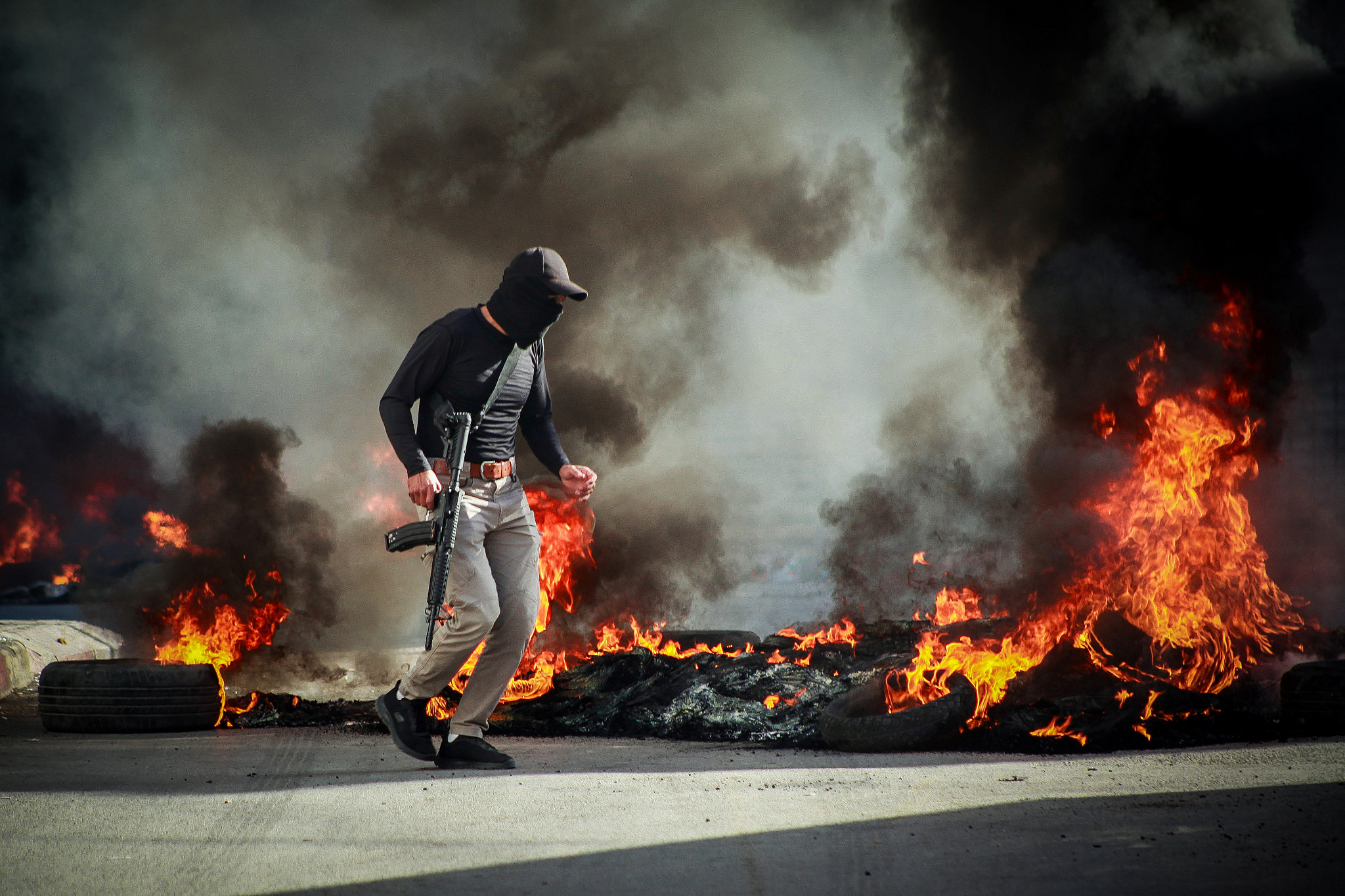In the early hours of Feb. 23, Israeli forces bombed a vehicle in Jenin refugee camp, killing three Palestinian camp residents. The target of the drone strike was 27-year-old Yasser Mustafa Hanoun, a field commander in the Jenin Brigade — ostensibly the armed wing of Palestinian Islamic Jihad (PIJ), but which for the past few years has operated as an umbrella group for a diversity of Palestinian youth ranging from PIJ, to Hamas, to Fatah, and even the leftist and secular Popular Front for the Liberation of Palestine (PFLP). Hanoun was killed instantly, in a bombing that also killed 17-year-old Saeed Jaradat and 20-year-old Majdi Nabhan, wounding 15 others.
In recent months, and in tandem with Israel’s ongoing bombardment of the Gaza Strip, the West Bank has been enduring a sharp intensification of violent incursions by Israeli forces. While 2023 was the West Bank’s deadliest year for some two decades with more than 500 victims, at least one-fifth were from Jenin alone.
In a similar trend since October 7, Israeli soldiers and settlers have killed 410 Palestinians in the territory with 93 from Jenin alone. Last year, the city had to bulldoze a plot of land just outside the refugee camp for a new graveyard, as the common cemetery had become too full, too fast.
Jenin refugee camp serves as a microcosm of Israel’s targeting of Palestinians who dare to resist its policies of dispossession and displacement. With the Israeli army making plans for a long-term “counterinsurgency” operation in Gaza as the next phase of its war, Jenin offers a window into what might be in store.
The point is the Palestinian, not the resisting Palestinian
The Israeli army’s incursions into Jenin and its refugee camp have been almost non-stop since October 7. By far the largest invasion occurred between Dec. 12-15, when Israeli soldiers besieged the entire camp for 60 hours — the longest and most violent raid of its kind since the camp was nearly destroyed during “Operation Defensive Shield” in 2002, amid the Second Intifada.
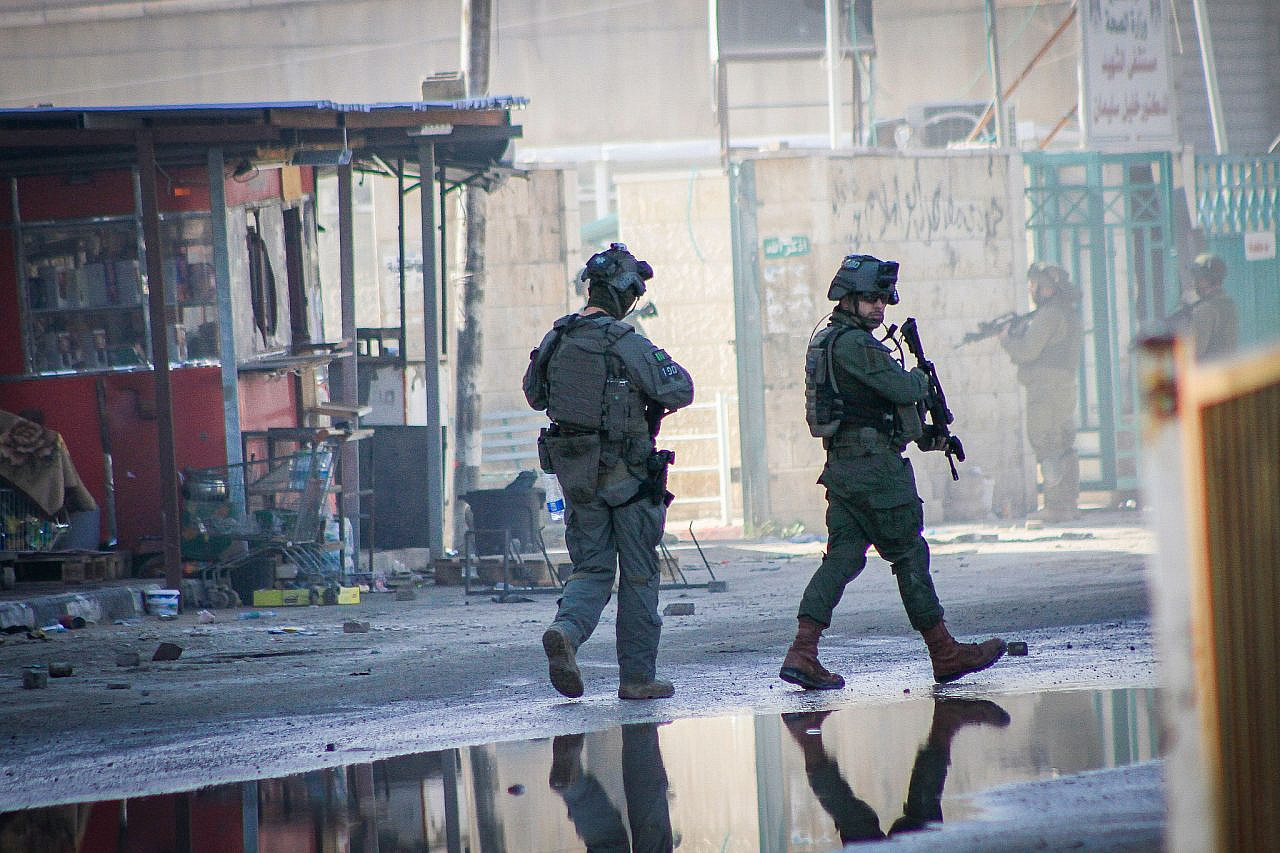
After completing the offensive, the Israeli army spokesperson claimed that it had detained 14 wanted persons and “eliminated 10 terrorists” in the camp. But according to eyewitnesses and residents, at least 12 Palestinians were killed — 10 of whom were civilians and non-combatants, including a child — while at least 42 others were wounded from Israeli gunfire, teargas, and attack drones.
“There’s no such thing as ‘this is a combatant and this isn’t,’” Sami, a man in his 30s, who chose to use a pseudonym out of fear of punitive measures by the Israeli military, told +972 while the invasion was taking place on the evening of Dec. 13. “We are all a target,” he added, as military jeeps patrolled the streets just outside the refugee camp.
Hours after the army withdrew on the morning of Dec. 15, Umm Imad Ghrayeb, 72, walked the muddy and ruined streets of the camp for the first time in three days. She didn’t know where to begin explaining the hours of horror she endured.
“It was just us old people, and my husband can’t even stand up,” Ghrayeb recounted to +972. “[The army] broke the doors of our home, even though we had left the door open to show we have nothing to hide.”
As with dozens of other families, the soldiers locked Ghrayeb and her husband in a room while the army turned the house into a military base. All the while, gunfire and bombings carried on around their homes. “All we could hear was loud bangs, one after the next,” Ghrayeb recalled.
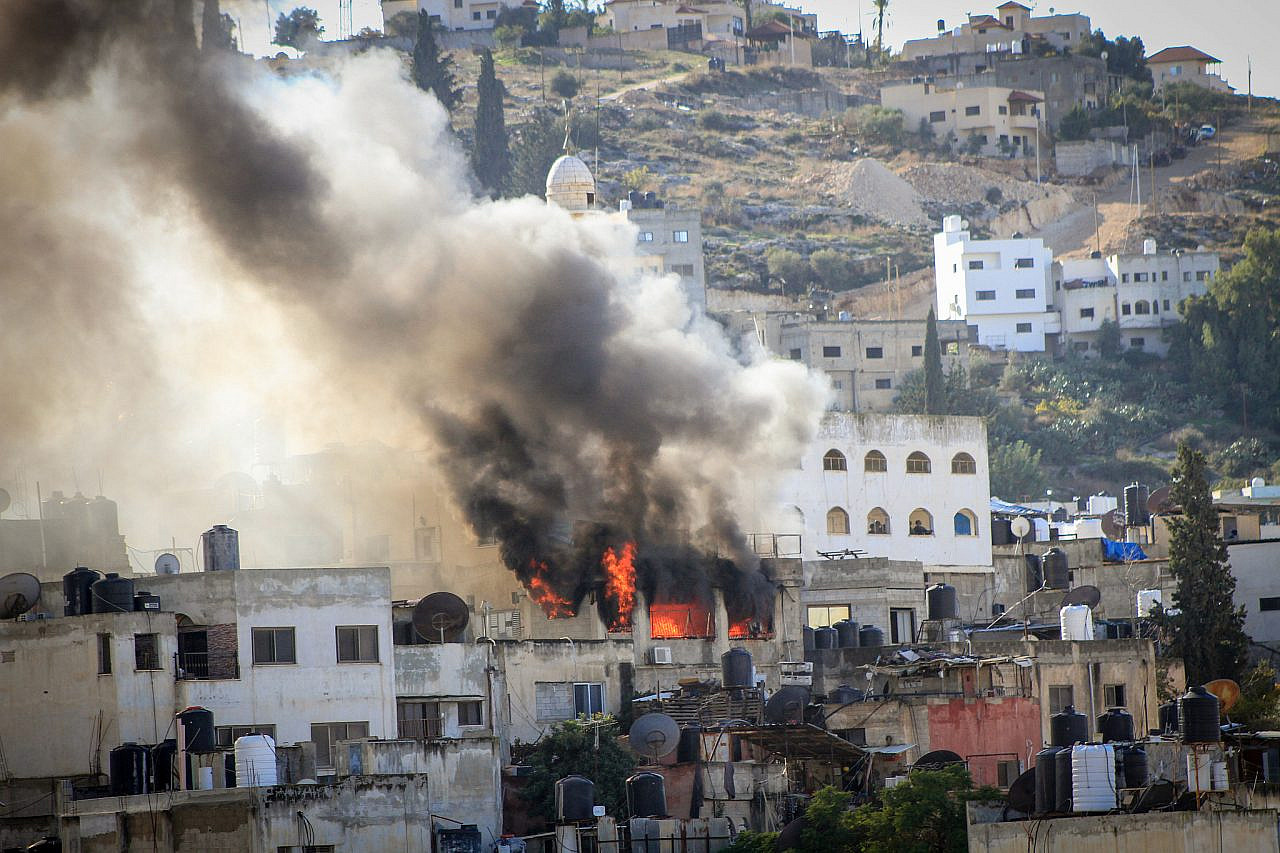
December’s attack was not a mere search-and-arrest operation, or even an operation targeting resistance fighters as the Israeli military claimed. At least 1,000 Palestinians — all men and boys, mostly youth, including people with chronic illnesses — were reportedly detained over the course of the 60-hour invasion. Most were eventually released, but not before being taken either to the Salem military camp northwest of Jenin, or being put through brutal field interrogations.
Those subjected to the latter were frequently blindfolded, stripped, and left in strenuous sitting positions, often outside in the cold and rain. Some of the detainees reported that soldiers plastered the Israeli flag on them while in custody; videos later corroborated these testimonies.
From one home in the camp, soldiers posted videos on their TikTok and social media accounts showing themselves cheerily smoking shisha in a living room while blindfolded Palestinian men were forced to sit on the floor.
More than wanting to describe the abuses endured, residents of the camp kept raising the same question: “Why?” Holding her palms together and still managing to maintain a smile, Ghrayeb recalled in a shaking voice: “All we did was pray: ‘Oh dear God, help us.’ What else could we do, dear?”
‘If we leave, then who remains?’
While residents of the Jenin camp were enduring a terror campaign, Palestinian resistance fighters confronted Israeli soldiers from outside the camp. Unarmed youth from neighboring areas also gathered, some hurling stones, others keeping watch, and some cursing the soldiers loudly.
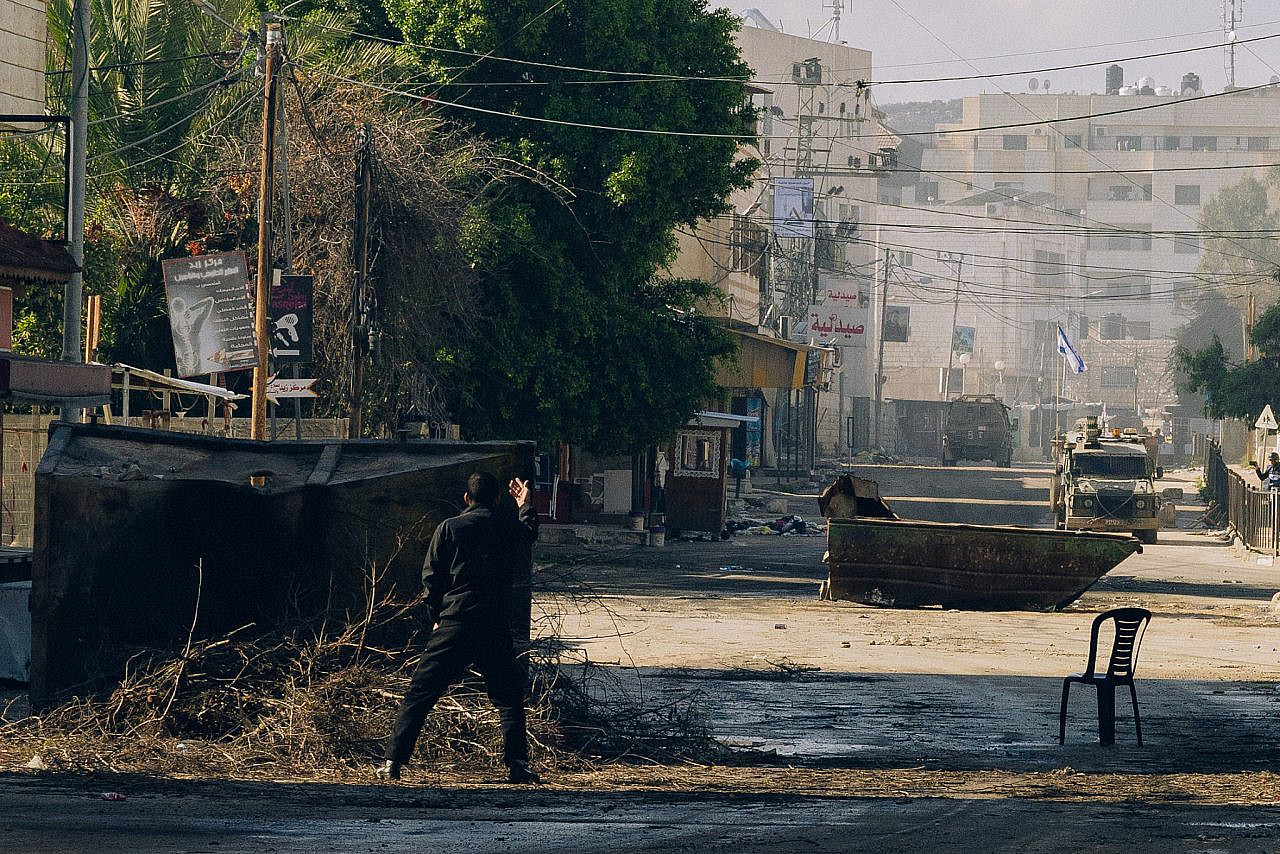
When I asked some Palestinian youth why they were out in the streets while the invasion was happening, despite knowing they wouldn’t be able to enter the besieged camp, many responded with a collective sentiment: “At least we’re trying,” and, “Maybe we could draw the attention of the soldiers onto us, to help alleviate the force of the violence on the camp.”
With armed resistance fighters no longer inside the camp, the refugee population was left unprotected and at the mercy of Israeli soldiers. The army laid siege to the area, blocking the movement of goods and cutting off the electricity and water supply. “The basic necessities for a human being are not being allowed in,” Eli, who also chose to use a pseudonym, told +972 as he watched the military jeeps from afar.
“Look at the camp,” Sami said as the evening got colder on Dec. 13, with the military advancing closer toward a group of youth gathered near a health clinic adjacent to the camp. “No one is allowed to enter. No ambulance. No milk for infants. Not even bread,” he said.
On top of all this, Israeli soldiers, including snipers, obstructed the entry of journalists and ambulances into the camp. Any attempt to approach the camp was met with Israeli aggression, including firing live ammunition directly at medical personnel and reporters.
Inside the camp, meanwhile, Israeli forces severely damaged numerous buildings as they rampaged from street to street. Nash’at Samara, along with his wife and children, were at his brother’s house outside the camp when the invasion began; he was only able to re-enter his neighborhood after the army withdrew. He did not return to a home, but the ruins of one: it had been blown up, the tiles in his kitchen peeled from the walls, and his family’s belongings ransacked.
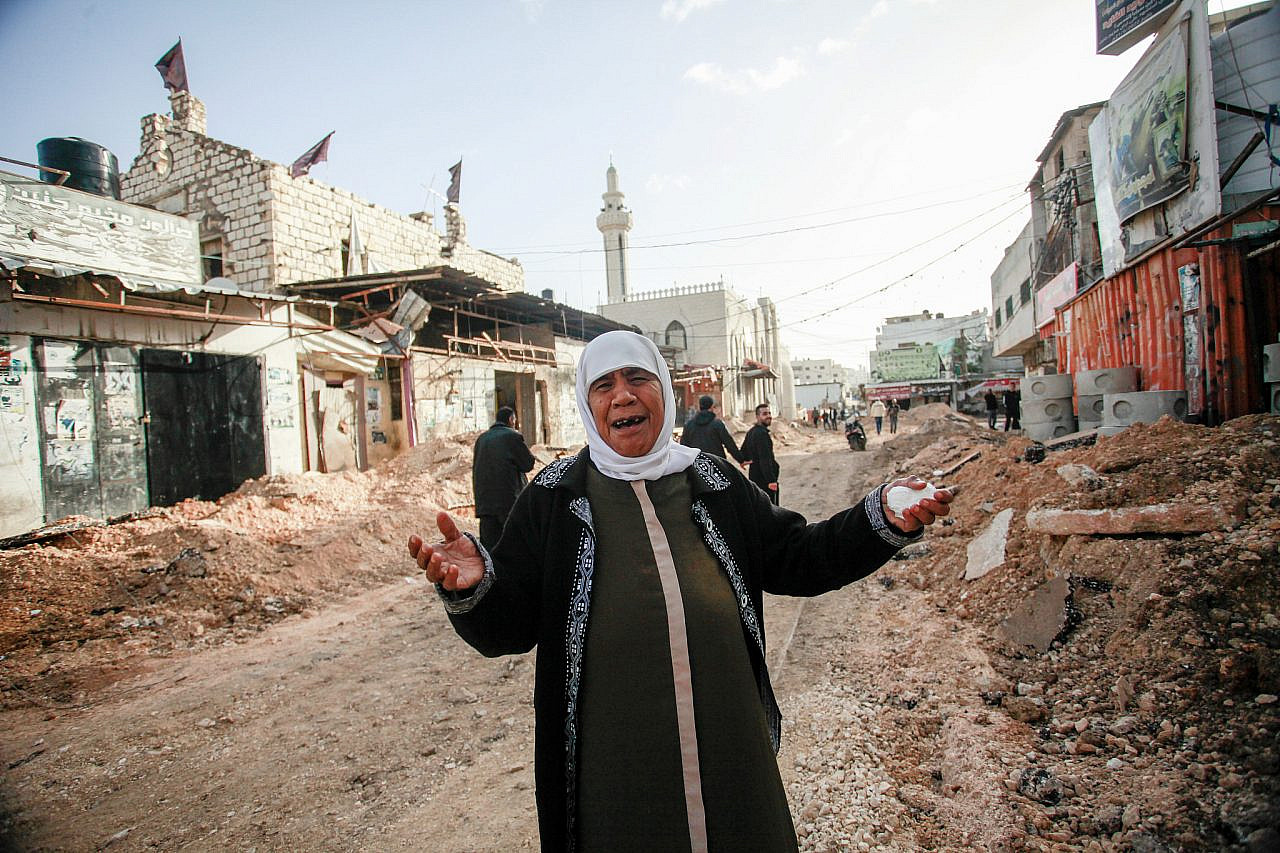
“Why did they destroy our home?” he asked +972 as he walked through the wreck of his kitchen. Looking at the food, now on the floor, he said with pain in his voice: “The resistance was fighting in the streets, or outside, not in the homes, and certainly not in the fridge.”
“The point was humiliation,” Walid Abu el-Fahed, 45, said of the invasion on the day Israel’s forces retreated, as he drove through the trail of destruction they left behind in the camp.
More than humiliation, however, these practices serve to push Palestinians out. For the Israeli military, invasions and military operations in civilian homes, hospitals, or schools, in addition to home demolitions and settler pogroms, have become increasingly common practice — all contributing to the deliberate dispossession and displacement of Palestinians.
In the span of 116 days between October 2023 and January of this year, Israel displaced 2,792 Palestinians in the West Bank. That is a 775 percent increase of people made homeless from the number of Palestinians displaced in the entire first nine months of 2023, combined. On top of that, like in Gaza, the majority of Palestinians killed in the West Bank are not resistance fighters but civilians, with almost a third being children and minors.
Nonetheless, many of the families still choose to remain in their homes, despite the difficulties. “We stay because we need to stay in our homeland,” Abu el-Fahed explained as his kids played in the backseat of the car, driving through the bulldozed streets of Jenin refugee camp. “If I leave with my kids, and she leaves with her kids, and he leaves with his kids,” Abu el-Fahed began to ask, “then who remains?”
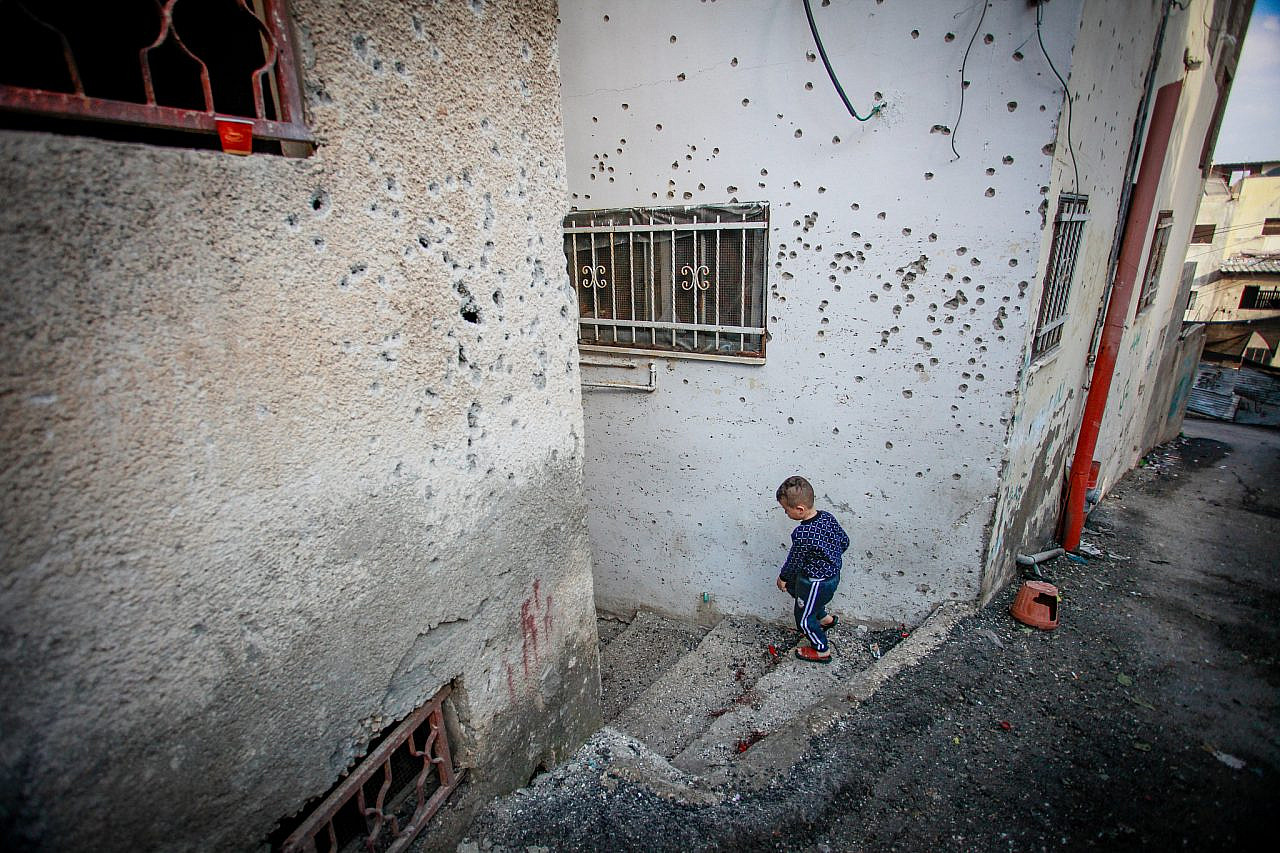
Birthing resistance
“I was born into occupation and soldiers, and will die by occupation and soldiers,” Eli said as the invasion and siege continued into its third night. “Shooting, killing, blood — that’s the life of the entire Palestinian population,” he continued in frustration.
The last time Israel conducted such a massive operation, though, was at the height of the Second Intifada in 2002. That incursion — part of “Operation Defensive Shield,” during which Israeli forces invaded several Palestinian cities in the West Bank over the course of a month — exacted an estimated U.S. $361 million cost in destruction of Palestinian infrastructure and institutions, according to the World Bank.
In addition to the material loss, the invasion created a generation of traumatized Palestinians who were not only deeply shaken by the events of that year, but have since had to grow up with further Israeli military violence. At the time, human rights groups warned of the negative impact that the 2002 invasion would have on those children.
More than two decades later, the Israeli army is still carrying out regular and intensified raids into Palestinian cities in the West Bank. Settlement growth has also been on the rise, and with that the rate and severity of settler attacks against Palestinians, which continue to enjoy almost total impunity under Israel’s justice system. Arbitrary arrests and humiliation at Israeli military checkpoints have remained the norm, and extrajudicial assassinations have become the modus operandi in recent years.
For Palestinians in the West Bank, the intensification of Israel’s attacks came particularly in the aftermath of the “Unity Intifada” in May 2021, during which Palestinians between the river and the sea rose up against the Israeli government and occupation forces. Israel subsequently launched “Operation Break the Wave,” a series of military operations across the West Bank which saw the use of lethal force against civilians and exra-judicial assassination missions, which are illegal under international law.
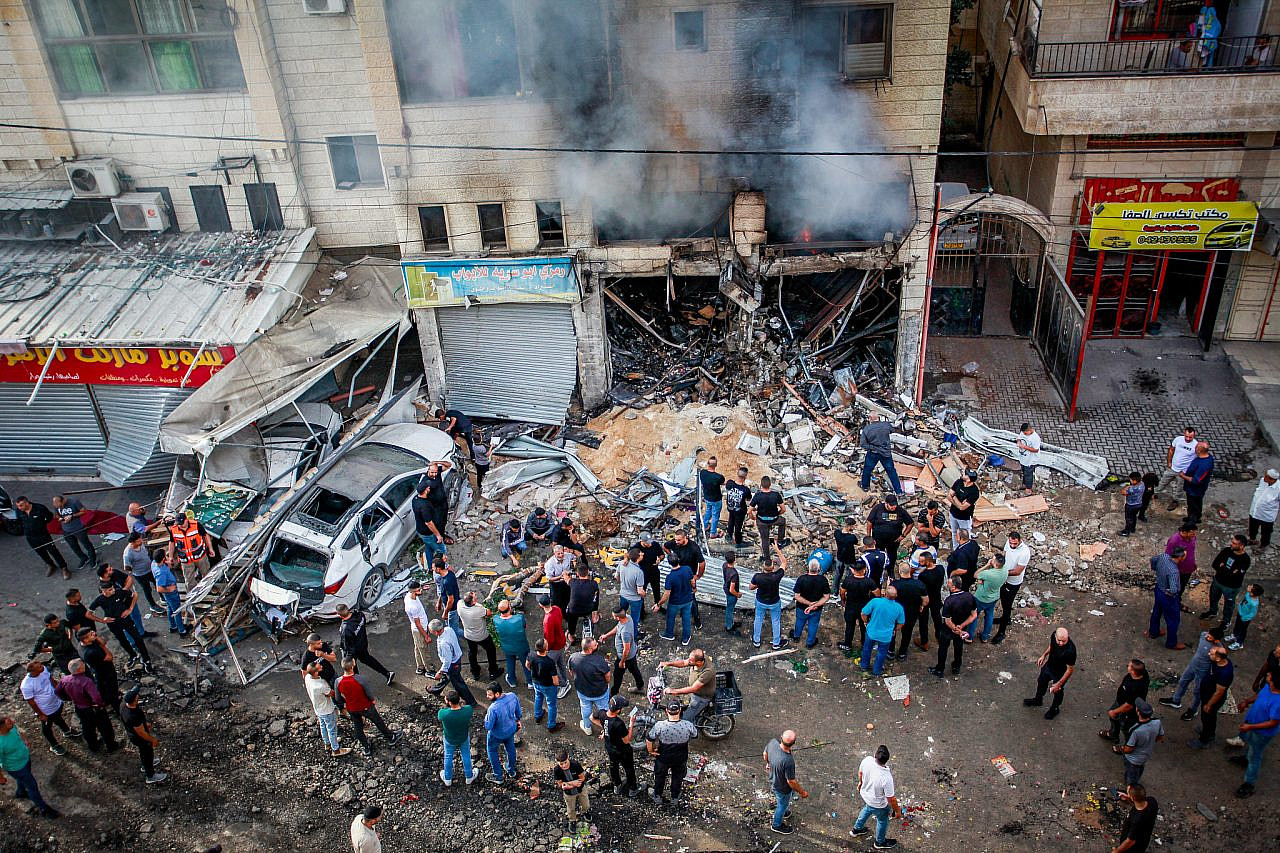
Unsurprisingly, then, the determination of young Palestinians to join military confrontations with the Israeli army has only grown. Following the Unity Intifada, large numbers of Palestinians began engaging in armed resistance, often joining local battalions that were not aligned with the traditional Palestinian political parties.
“Remember, the kids of 2002 are now the resistance,” Abu el-Fahed, a resident of Jenin, told +972 hours after the withdrawal of the military in December’s invasion. He still remembers the brutality and fear of those weeks. “[Israel] tried to displace us in 2002,” he recalled. “They destroyed the homes on top of our heads, detained us en masse, and killed us.”
This inevitable reality is one that is neither secret nor unexpected for Palestinians generally, and those in Jenin specifically. “What they destroy we will rebuild, and our children will be leaders,” Abu el-Fahed said.
Yet in order to be able to raise leaders, the children must remain alive. While Israel carried out its December operation under the pretext of targeting suspected Palestinian fighters, using the Hamas-led October 7 attacks on southern Israel as a peg for justifying the lethal incursion, at least one-fifth of those killed in Jenin were children and minors.
‘We’re being killed anyway’
Continuing on the same track, on Jan. 30, undercover Israeli forces carried out an assassination operation in Jenin’s Ibn Sina hospital. Shortly after dawn hours, soldiers from the notorious Duvdevan unit — who were disguised as Palestinian medical staff and patients — entered the hospital, took out their weapons in the face of the real staff and patients and marched toward the third floor of the hospital.
There, the undercover forces extrajudicially assassinated Basel al-Ghazzawi, an 18-year-old fighter in the Jenin Brigade, who was receiving treatment for injuries he had sustained in a previous assault on Jenin by the Israeli military. Israel had been trying to assassinate him for the past year and a half.
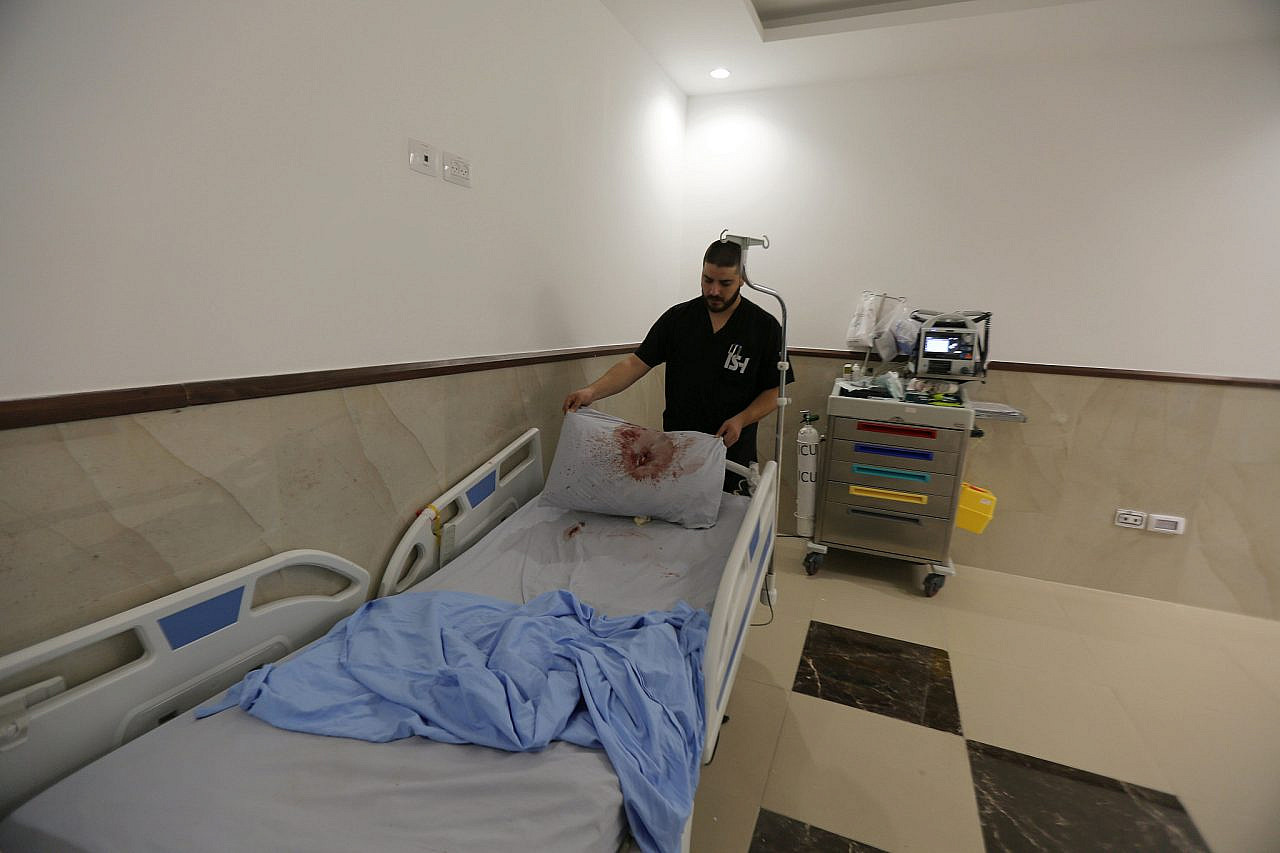
Another two men who were visiting al-Ghazzawi were also killed: his 23-year-old brother, Mohammed al-Ghazzawi, who is one of the co-founders of the Jenin Brigade, and their friend, Mohammad Jalamnah, 27, who is a senior fighter with the Brigade. According to local reporters on the ground, the undercover Israeli unit killed the three men with muffled guns.
Despite the men being active fighters in the Jenin Brigade, their assassination at Ibn Sina hospital was not only illegal because it is extrajudicial killing, it also violated the Geneva Convention. More alarmingly, this attack signals an escalation in Israel’s brazen crimes in the West Bank.
In October 2022, I interviewed the prominent Palestinian resistance fighter Nidal Khazem, asking why he chose to take up arms despite the risk it poses to his life. Khazem said very calmly: “[The Israeli army] comes here, kills our friends and family, abuses and humiliates the women, and denies us access from [worship] in Al-Aqsa.” This sentiment was shared by most resistance fighters I have interviewed over the last two years across the West Bank, all echoing the same view: “We’re being killed anyway.”
Khazem was killed several months later, in March 2023, in an extrajudicial assassination carried out by Israeli undercover forces from Duvdevan. Yousef Shriem, another resistance fighter and a close friend of Khazem, was also killed. A third, 13-year-old boy was also killed as he rode his bike through Jenin during the operation.
In July 2023, just three months after the killing of Khazem and Shreim, Israel carried out another destructive invasion into the Jenin camp using drones, an armed helicopter, and heavy artillery on the ground. Over the course of two days, the Israeli army tried and failed to maintain a full hold on the refugee camp, coming under fire from resistance fighters with a fraction of their military capacity and resources.
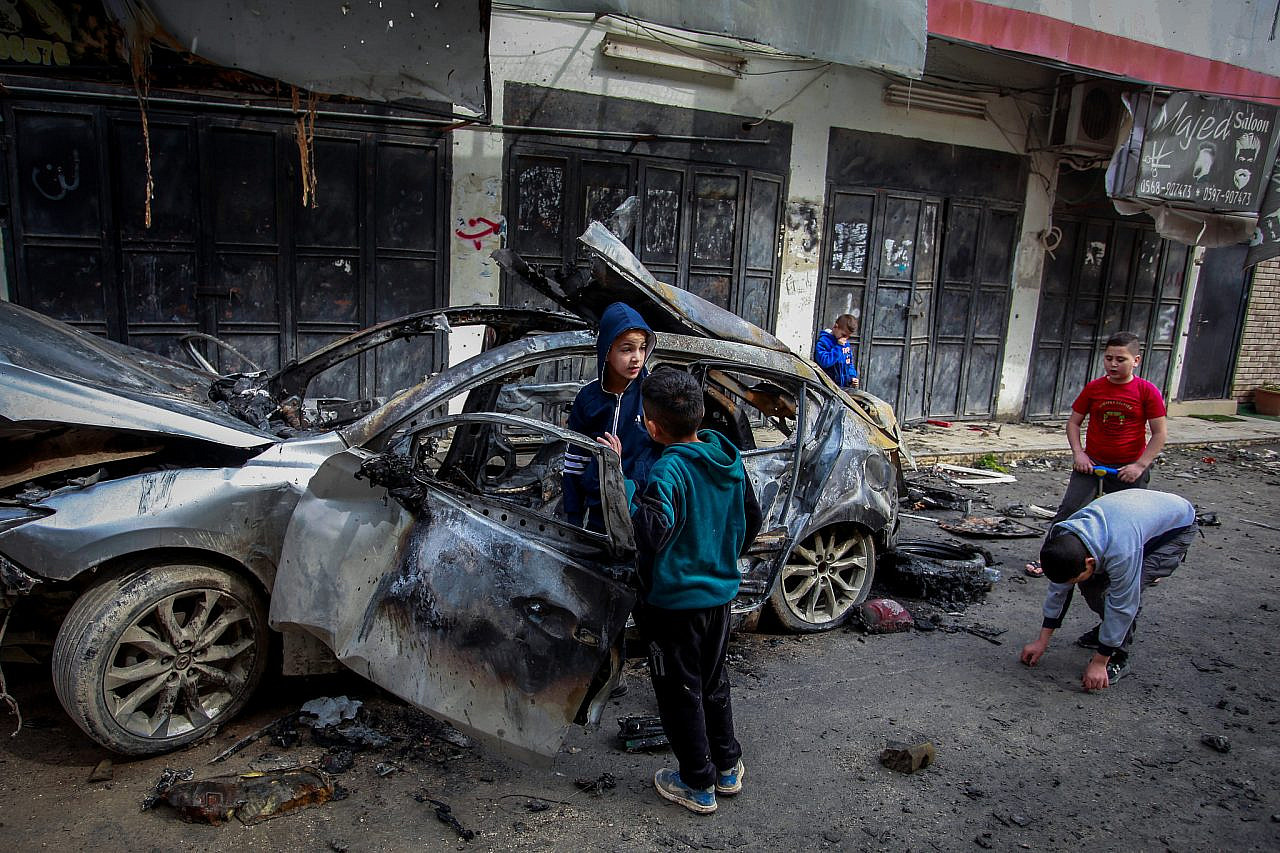
During their lethal raids on Palestinian refugee camps, towns, cities, and villages, the Israeli military has killed more civilians than Palestinian militants. Israel has not only been unable to stop the growth of armed resistance groups in Jenin refugee camp, but provoked the rise of more armed resistance in different districts including Tulkarem, Nablus, Ramallah, Hebron, Tubas, and Jericho.
The only protection Palestinians seem to have are the armed resistance groups, despite their small size and lack of weapons. In their attempt to eradicate them, Israel is paving the way for creating a completely unprotected Palestinian community — elderly, young, and sick alike — leaving easy pickings for one of the most advanced militaries in the world. Unable to curtail the resistance or effectively target the fighters, however, the Israeli army has resorted to launching extrajudicial assassination attempts at times when the fighters are at their most vulnerable and not engaged in battle.
“What they did in the camp is a mimicry of Gaza — from humiliating the men and stripping them naked, to the attack on the mosque and the destruction of homes,” Abu El-Fahed summarized, pointing at the gray buildings that were once homes in the camp.
‘The goal is one: liberating Palestine’
Unlike in Gaza, however, Palestinian armed groups in the West Bank do not have a single organized body for armed confrontation. Instead, it is groups of community men, neighbors, relatives, and childhood friends that find themselves facing not only a powerful army, but one that operates with discriminatory policies that enforce persecution and apartheid.
“What do you think it means to be [affiliated with] Hamas or Palestinian Islamic Jihad?” a Hamas fighter in his 30s, who will be referred to here as “A.” asked, sitting in a small living room in Jenin refugee camp in mid-October. “It means being able to purchase a gun,” he said as another fighter next to him nodded in agreement.
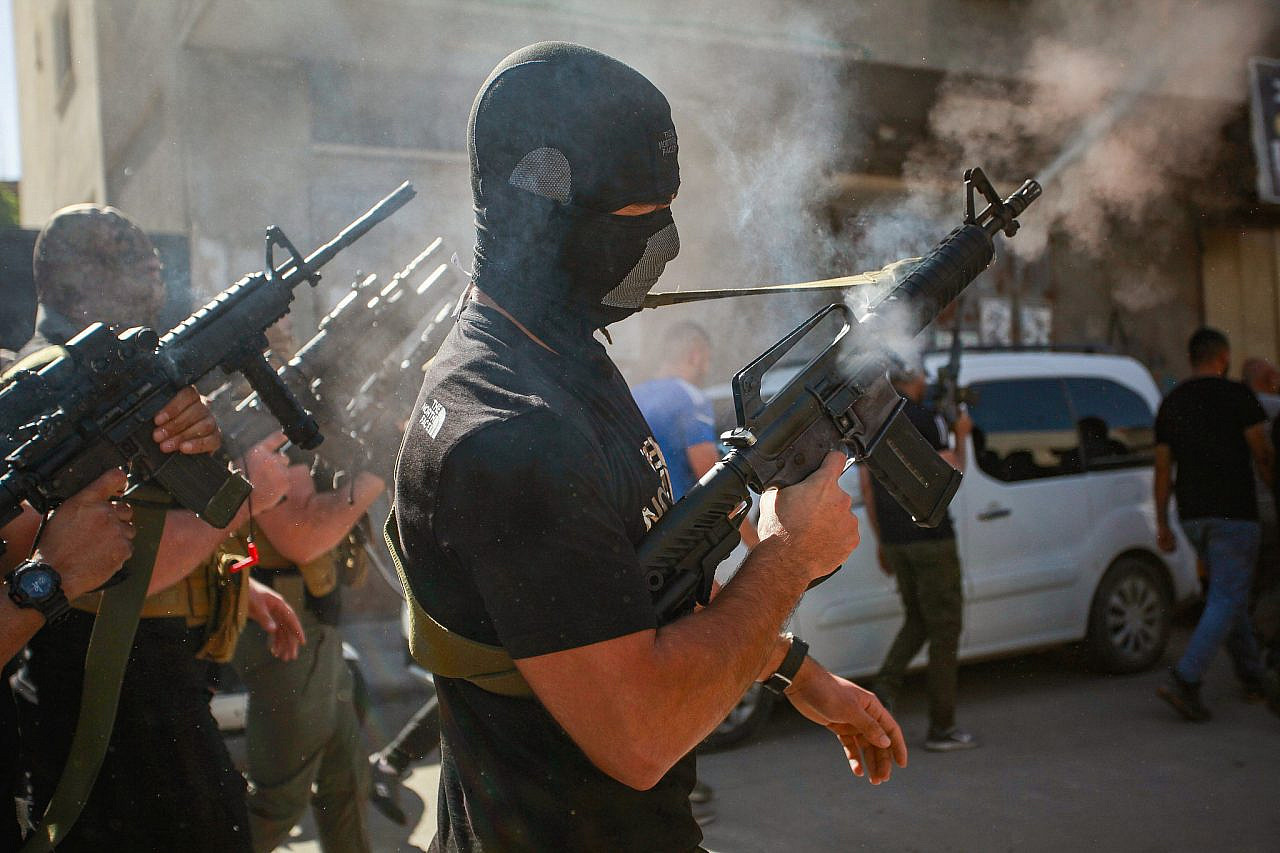
The other man, “B.,” had defected from the PA’s Palestinian Security Forces — where he was an officer — earlier last year. Although the pair belonged to rival political factions, one from Fatah and the other Hamas, they stood together as one battalion under the umbrella of the Jenin Brigade.
“For PIJ, it’s not about power or money,” a third fighter, “C.,” who is barely 20 and the youngest of the bunch, told +972 as he sat next to the two men. “The goal is one: liberating Palestine so we can live freely. That’s why I fight with [PIJ], but it’s not for them.”
The men collectively emphasized that whether it’s Hamas, Fatah, PIJ, or any other factional association, in the end they’re of the same community seeking protection from the continued and intensified assault on their lives by the Israeli authorities, military, and settlers.
“Understand that for us, these are avenues of confrontation,” A. explained. “We’re humble people, so we have to scrape together money to afford a gun to fight back.”
For the Palestinian resistance fighters in Jenin and elsewhere in the West Bank, political affiliation as a mechanism of drawing lines of division is a thing of the past. It is no longer a frame of Hamas versus Israel or lone-wolf attacks, but all gathered under the umbrella of confronting the Israeli occupation which has reached the pinnacle of its aggressive practices in the ongoing genocide of Palestinians.
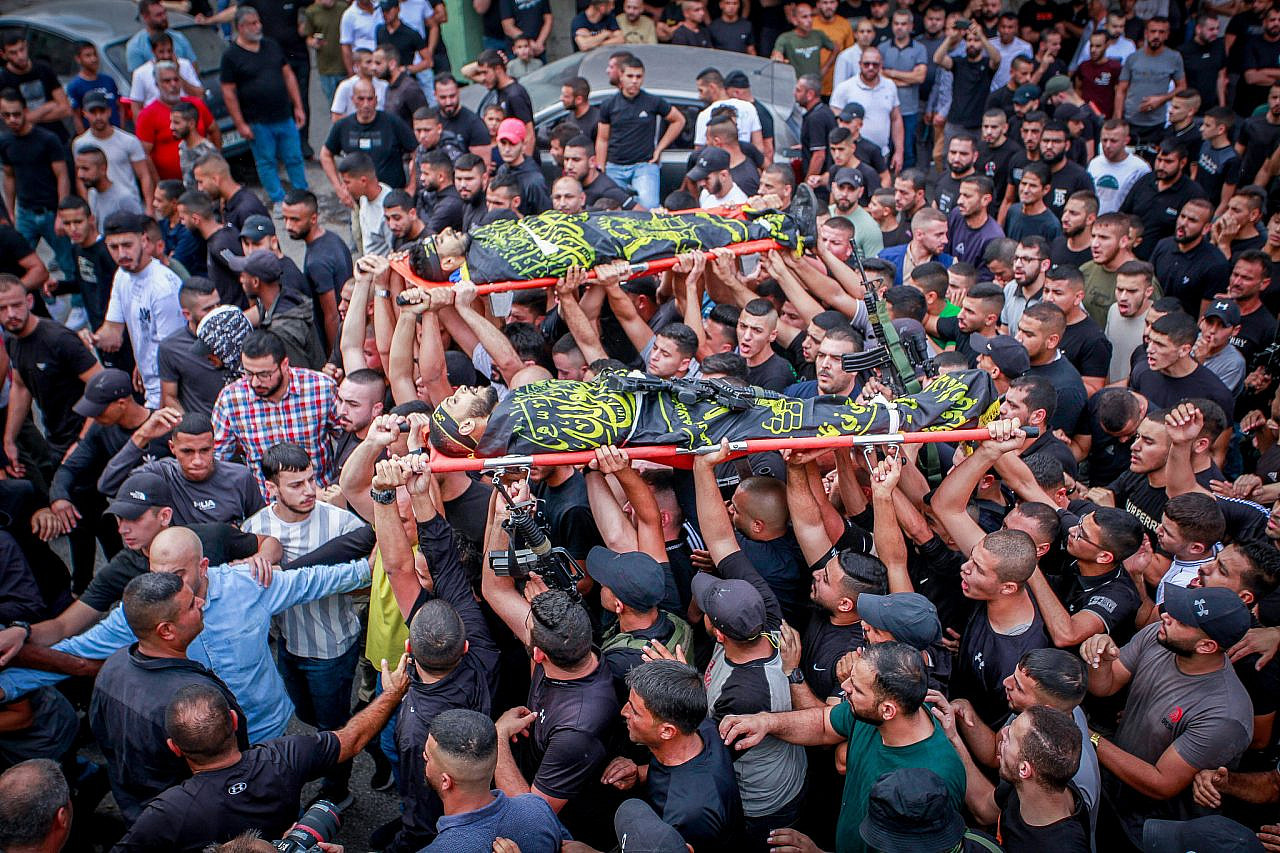
While the political underline varies from Gaza, in the end, Israel treats Palestinian everywhere in the same way. “We are a target bank for [Israeli National Security Minister Itamar] Ben Gvir and [Prime Minister Benjamin] Netanyahu,” “D.,” a fighter in his 40s, explained as he kept watch of the two Israeli jeeps nearby, ready to charge toward the city center at any moment.
“The Israeli army is failing in Gaza and came to gain achievements in Jenin,” he continued. “It is so the Israeli media can show its people that they’re achieving goals.”
Most read on +972
For Palestinians in the West Bank, as well as Gaza, the fight for justice and freedom persists. The more Israel intensifies its violent military operations under the pretext of quelling resistance, the more it seems to provoke.
“This occupation doesn’t impact us and our will to confront [Israel],” “E.,” 18, told +972 as he gathered along with his friends and neighbors to maintain presence in the streets amid Israel’s terrorizing campaign in Jenin in the violent evenings of mid-December.
“They think we’re broken branches, but if they keep pushing us we’re ticking bombs that will explode,” he said.

